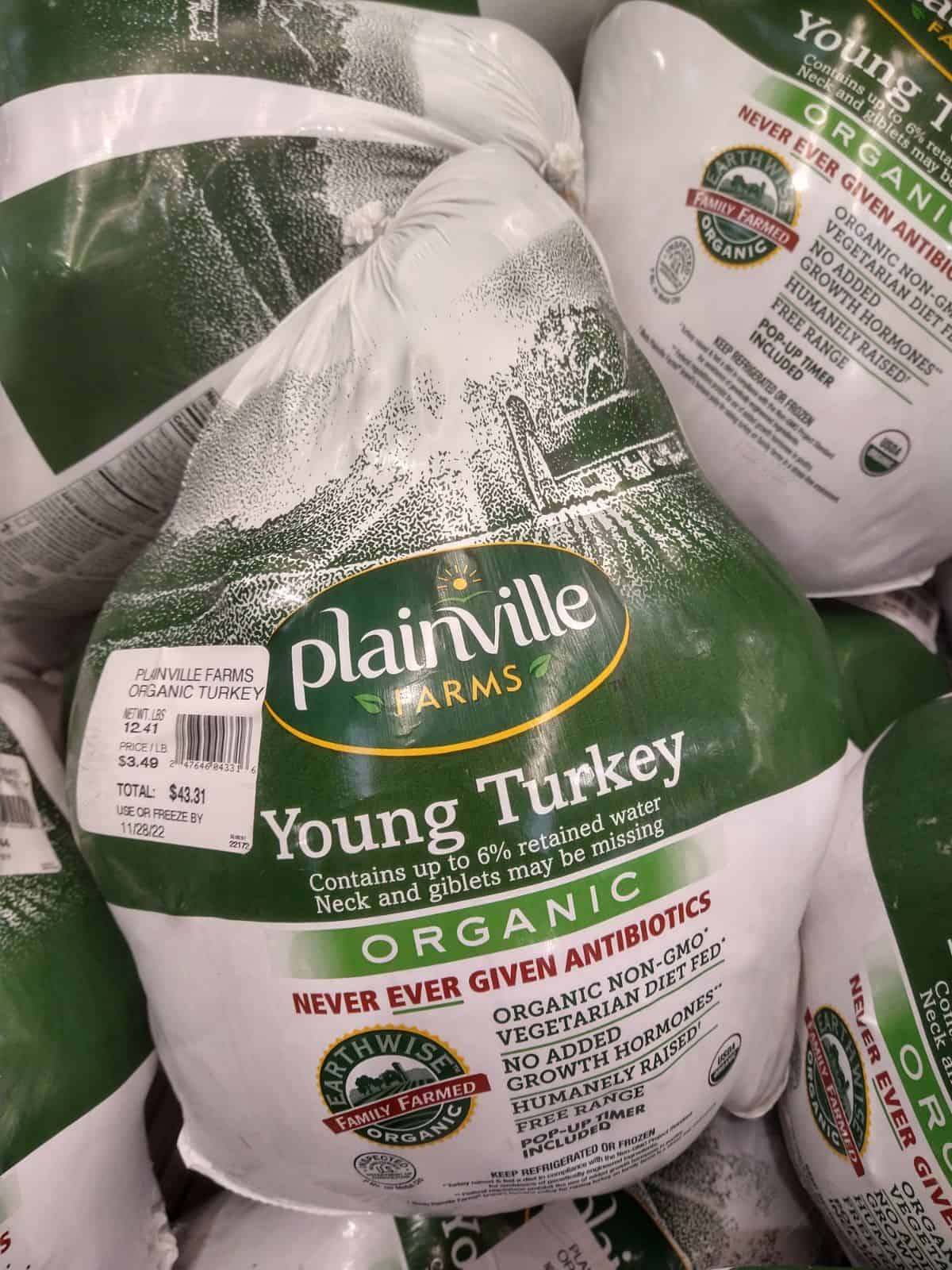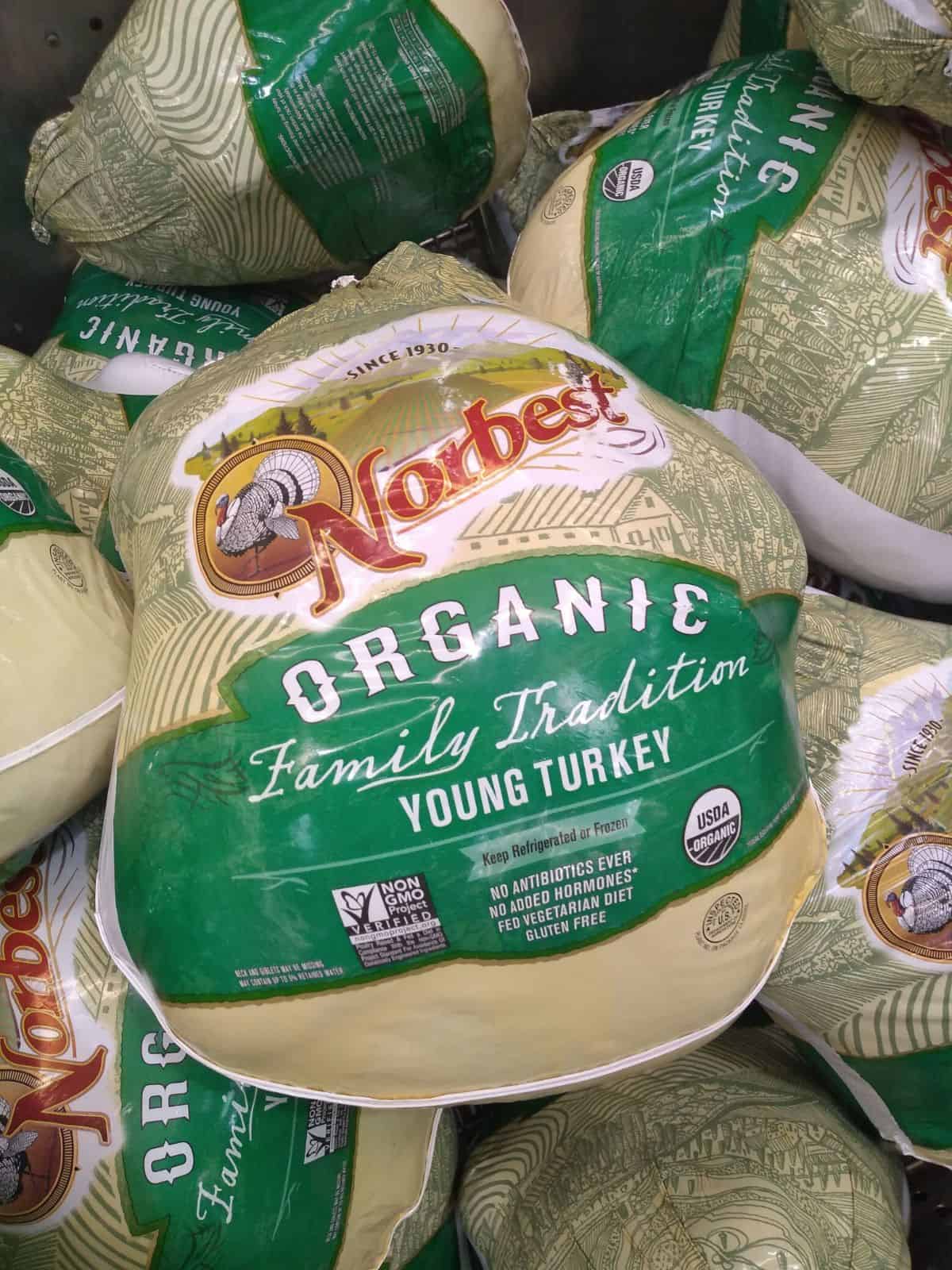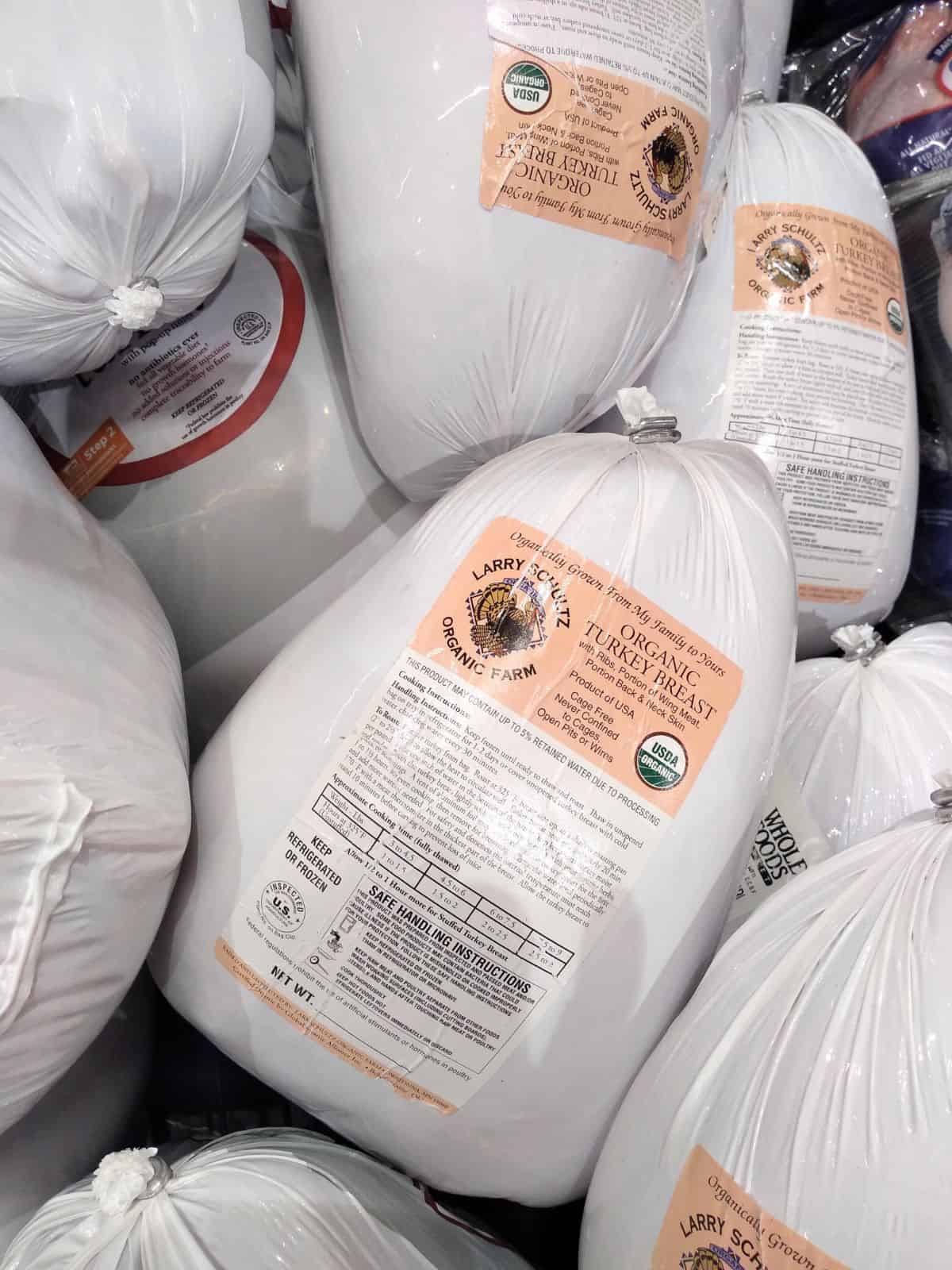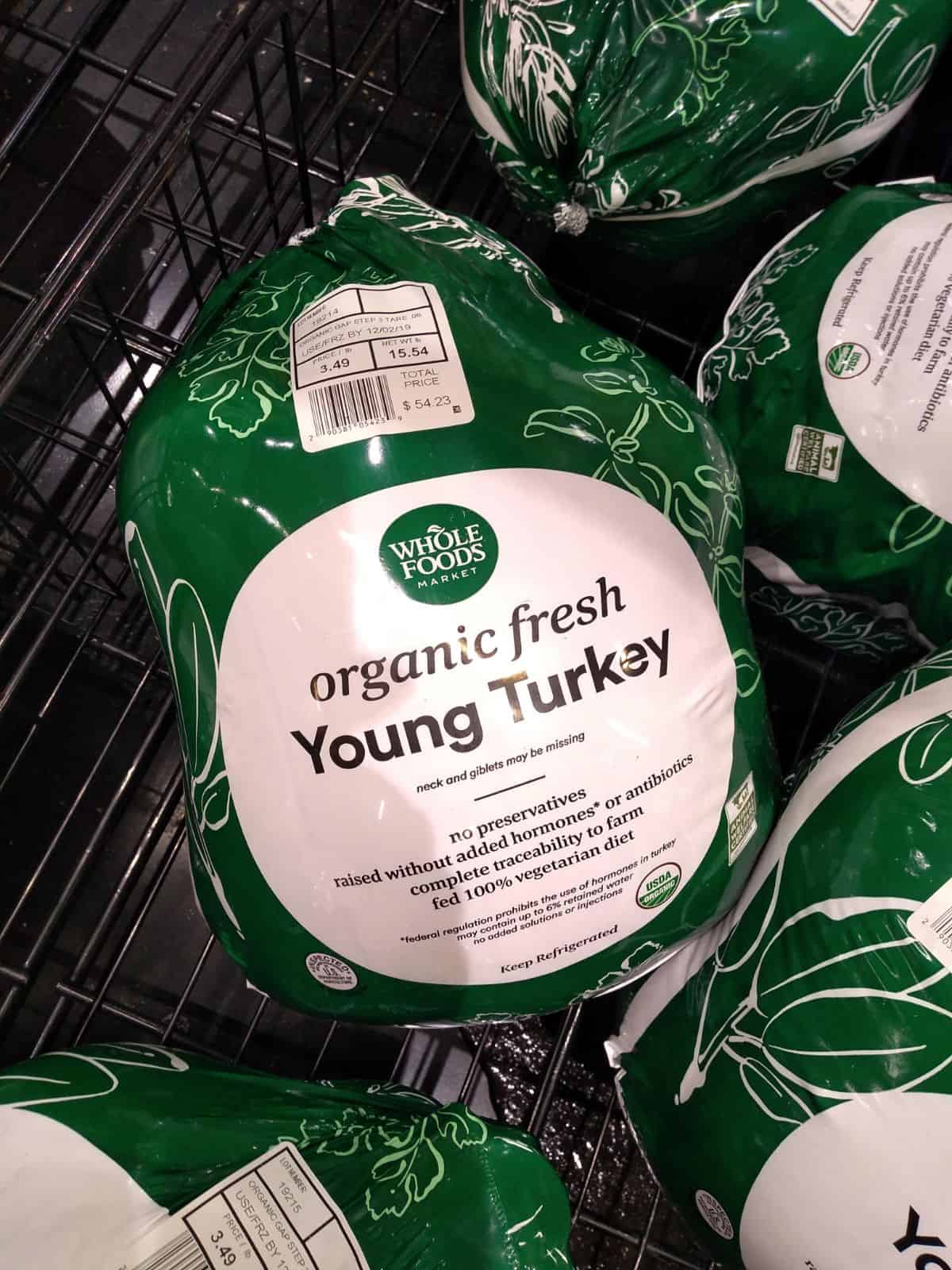Looking to buy an organic turkey this Thanksgiving? Let us show you what you are getting when you buy organic. We will explain the difference between an organic bird and a regular/conventional bird. And lastly share organic turkey prices from around the country.

As you are pursuing your options for this year's Thanksgiving bird, one of the factors you must consider is whether or not to get an organic turkey.
How much is that going to cost? And what really is an organic turkey? We will answer both of those questions for you.
Jump to:
💲 Organic Turkey Prices
It would be easy to buy organic if money is not object, but for many of us that is not the case. Here are some organic whole turkey and turkey breast prices I have seen in the past in the grocery store (prices may be different at you store).
| Store | Type of Turkey | Price |
| Costco | Plainville Farm Organic Turkeys | $3.49/lb |
| Costco | Norbest Organic Turkeys | $3.49/lb |
| Costco | Foster Farms Organic Turkeys | $3.49/lb |
| The Fresh Market | Fresh Organic Whole Turkeys | $4.49/lb |
| Wegman's | Wegman's Organic Turkey Breast | $6.99/lb |
| Whole Foods | Organic Whole Turkey | $3.99/lb |
| Whole Foods | Organic Turkey Bone-In Breast | $6.99/lb |
| Whole Foods | Organic Heirloom Whole Turkey | $4.99/lb |
🎧 Want to learn more about prices of turkeys in general? Listen to our podcast episode on - What to Expect to Pay for a Turkey.
In 2022, Whole Foods Market was offering organic turkeys for $2.49/lb for those that are Amazon Prime members but I didn't see that deal in 2023. That's a dollar a pound cheaper than Costco. You rarely see any special promotions on organic turkeys so that was a great deal. This year, I have only seen organic turkeys for $3.99 a pound Whole Foods.
Let's break down the total cost of an organic turkey by pound if you were to buy an organic turkey at Costco for example.
| 12 lb | $41.88 |
| 13 lb | $45.37 |
| 14 lb | $48.86 |
| 15 lb | $52.35 |
| 16 lb | $55.84 |
| 17 lb | $59.33 |
| 18 lb | $62.82 |
| 19 lb | $66.31 |
| 20 lb | $69.80 |
| 21 lb | $73.29 |
Overall when you think about it, that isn't a bad price to pay for meat, especially when compared to beef.
But it's hard when you have options that are under $1 per pound. I get it. This post isn't meant to make you feel guilty if you can't afford an organic turkey, but more to explain what one is so you can make an informed decision for your dinner table this Thanksgiving.
Most of the time you are going to find that organic turkeys are fresh turkeys. I don't recall seeing them frozen at all or at least not often.
❓ Why Organic?
You know why you would want to buy organic fruit or vegetables - to avoid food being directly sprayed with pesticides.
But they certainly don't spray pesticides directly on turkeys. So wouldn't all turkeys be organic?
The USDA has certain requirements that turkey or any poultry must be to be certified organic. As you read them you will see why all turkeys are not organic.

🗳️ Federal Regulations
Here is what organic turkeys must eat and how they must be treated to be USDA Organic certified.
Farmers and ranchers must accommodate the health and natural behavior of their animals year-round. For example, organic livestock must be:
To read more visit the USDA's website
– Generally, managed organically from the last third of gestation (mammals) or second day of life
(poultry).
– Allowed year-round access to the outdoors except under specific conditions (e.g., inclement weather).
– Raised on certified organic land meeting all organic crop production standards.
– Raised per animal health and welfare standards.
– Fed 100 percent certified organic feed, except for trace minerals and vitamins used to meet the animal’s nutritional requirements.
– Managed without antibiotics, added growth hormones, mammalian or avian byproducts, or other prohibited feed ingredients (e.g., urea, manure, or arsenic compounds).
One of the regulations is that they must be allowed year-round access to the outdoors. They would qualify them as being a free range turkey. I don't believe there is a specific amount of hours and space that must be adhered to.

🌾 100% Organic Feed
The two biggest things here is that the turkey is raised on organic land and fed 100% organic feed. What goes in the turkey need to be organic.
If you are eating the turkey you are eating what the turkey ate indirectly. If that concerns you, you may want to consider an organic turkey.
In mass production of turkeys at places that are more like factories than farms, turkeys are fed a diet high in grain and corn without the food they would get if they were allowed to roam free.
The cheap feed in all likelihood is going to have been treated with pesticides when growing and if it's corn or soy is going to likely be genetically modified corn or soy. The chemicals they ingest can end up building up in their fatty tissues, which you then eat. Yummmy!
Just so you know - roasting time is no different for an organic turkey. Cook them the same way as any other turkey.
💊 Antibiotics
Another thing to be concerned about is antibiotics. When living in such tight quarters, sickness and disease is more likely.
So the poultry is given antibiotics in their feed to protect them and any remnants of the antibiotics that remains in their system we digest. A turkey cannot be given antibiotics if it is to be considered organic.
You can find turkeys that are not organic but are still antibiotic free. Check the packaging in the store.
Plainville Farms turkeys that I have seen sold at Costco are antibiotic free, both the organic and the conventional.

🚜 Knowing Where Your Food Comes From
Just because a turkey is not organic doesn't mean that it was fed "toxic sludge" it's whole life. This is where getting to know where your food comes from is important.
If you have concerns, express them to whoever produces the turkey you want to buy. If you don't get the answers you want, move on. There is plenty of time now before Thanksgiving to ask these questions.
💉 Growth Hormones
Whether organic or not, all turkeys grown in the US must be done so without given growth hormones. Use of hormones is illegal, no matter how you raise your bird. So when that is listed on the packaging for a turkey is really isn't telling you anything you didn't already know.

🙋 Are Heritage Turkeys Organic?
A heritage turkey is a turkey that is an older breed. They are now for having less white meat, darker dark meat, and are stronger flavor. They aren't easy to come by in most grocery stores. Look for places that sell Mary's Turkeys. Most people want them because they are a flavorful turkey.
Are they organic? Not necessarily. They would need to be certified. However anyone taking the time to raise heritage turkeys is likely to treat them better and feed them better. Since they are smaller operations, you should be able to find out more about how they are raised.
Elmwood Stock Farm Turkeys that are raised in Kentucky have organic heritage turkeys. Some Whole Foods stores on the west coast carry them as heirloom turkeys.
🦃 More Turkey Posts
I love talking turkey on the blog. One of my most popular post is on How Far in Advance to Buy a Fresh Turkey. Here are some other posts on turkeys -
- How to Dry Brine & Butterfly a Turkey
- How to Cook a Turkey Breast in the Instant Pot
- How to Reheat a Smoked Turkey
- Instant Pot Smoked Turkey Gravy
- View All of Our Turkey Recipes

🔨 Best Tool
I always cook my turkeys to temperature and not time. When you have had a perfectly cooked turkey, it's life changing. It's never dry. I recommend using the DOT® Simple Alarm Thermometer from ThermoWorks. It's more durable than the ones I have got in the stores and have had to replace several times when the probe stop working.
For this thermometer you place the probe into the turkey and then put it in the oven. You can then track the temperature while it cooks, so you will know the exact moment it's perfectly cooked. Trust me it will save your Thanksgiving!
📧 Sign Up for Our Email List
Feeling anxious about cooking the meal? Not sure whether brining your turkey is worth your time? Hate peeling potatoes for mashed potatoes but don't know any other way? Never sure when a pumpkin pie is done?
If you have questions like this that have brought stress or anxiety to what should be a fun meal to cook, then you need to sign up for our Thanksgiving Anxiety Reducing email list.


CR
An Antibiotic Free Turkey is not the whole picture when shopping. They have to be grass fedand treated humanely. I found Trader Joe's selling Kosher Turkeys that are feed 100% corn. Not something I would recommend.
Mark
With organic turkeys, as you mention, they are fed organic food. This is critically important especially with any genetically modified feed, which you also mentioned- but to completed the story, genetically modified feed (such as corn or soy) has insecticide not just ON it, but in it-- and that insecticide is glyphosate (commonly known as Roundup). Of course this is the same thing you injest if you don't eat organic corn or at. So in the end, if you don't eat an organic turkey, in addition to antibiotics, you are also consuming insecticide. Reason enough to pay a bit more for organic- as the saying goes.. " Pay the farmer or pay the pharmacist!"
Eric Samuelson
That is a very important point as well. Paying the farmer is far better (and a lot cheaper!)